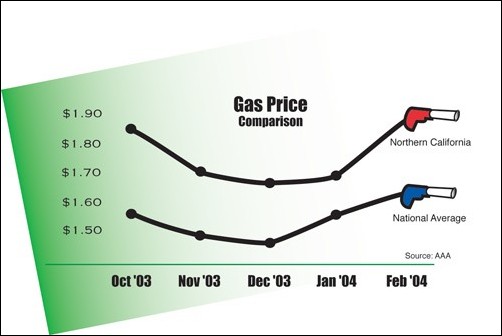Pump Up The Prices

Image: Pump Up The Prices:Graphic by Richard Coppa/State Hornet:
March 17, 2004
Gas prices in California recently soared to record highs, and are expected to remain high throughout the summer.
According to AAA, the average price of gas in Sacramento is currently $2.11, up from $1.77 a month ago and $2.06 a year ago.
California gas prices hit a record high on March 5 when a gallon of regular gas averaged $2.178 statewide, which beat the old record established last year of $2.177.
Sacramento State student Marnie Marshall, a junior majoring in art education, commutes from Nevada City to Sac State for class twice a week. The commute can take her anywhere from one- and-a-half to two-and-a-half hours and she spends approximately $40 a week on gas for her Honda Accord.
“I have to grin and bear it,” Marshall said. “It is not something I can avoid. People here with SUVs spend $400 a month on gas, and it is just astronomical to me.”
Sean Comey, a spokesman for AAA of Northern California, said that prices rise very quickly, but tend to fall slowly. Comey said it was possible that the prices could go even higher for summer.
“Last year, at this time we were getting ready to go to war with Iraq, so the uncertainty about the war was the reason for high gas prices,” Comey said. “This year, there is cause for concern because the prices are even higher and the war is over.”
Comey said one reason that California is especially hit hard by the increase in gas prices is because California is required to have a unique blend of clean burning gas. Approximately 90 percent of the gas must be refined in-state to meet strict air quality requirements.
“California can’t import gas from other parts of the country, so if our supply runs low the price of gas increases,” Comey said. “Other states can get gas from a variety of sources, but California doesn’t have those options.”
Comey said that around February and March every year, refineries must switch over to a special summer blend of fuel that requires the refineries to restart and retool.
According to the California Energy Commission, three California refineries experienced unexpected difficulties while restarting for the summer blend, resulting in cut production and a sharp increase in prices. Additionally, crude oil prices are currently high because the Organization of Petroleum Exporting Countries has reduced production.
Marshall said that the university should have a program for people who commute from the same area so they can carpool, and she is currently exploring alternative ways to school.
Legislation planned to increase competition
Dave Fogarty, spokesman for Western States Petroleum Association, said that the Organization of Petroleum Exporting Countries, the free market, and supply and demand dictate gas prices. The association represents oil and energy companies in California and five other western states.
However, some contend that gas prices are being manipulated by oil companies looking to make a profit.
Democratic Congressman Mike Thompson of Napa Valley has introduced a bill that would increase competition in the gas industry.
Refineries can charge different wholesale prices for gas, and often will charge the lowest prices to stations that are owned or operated by the oil company. Wholesale prices can also be raised in certain areas to stifle competition and maximize profits.
The legislation proposed by Thompson would require oil companies to charge the same wholesale price to all service stations, regardless of ownership. The bill has been referred to the House Energy and Commerce Committee.
An energy analyst based in Washington D.C., who did not want his name published, said the Bush administration is not likely to support legislation that would help to lower gas prices.
“I find it more than a coincidence that gas prices go up every year when summer comes around and people are out driving more,” he said. “It is a profit-based business, and consumers in the United States have no option but to pay the prices. The refineries can plan in advance for the turn-around if they wanted. It is gross commercialization.”
Tips to conserve gas
There are several easy ways to help conserve gas. According to the Utility Consumer’s Action Network, driving aggressively wastes more gas, including rapid acceleration or braking and speeding. For every 5 mph driven over 60 mph, it is like paying an addition $0.10 per gallon for gas. Using cruise control or driving in overdrive gears can help save gas.
Other ways to reduce gas usage include not running the air conditioner on a hot day, and not allowing a car to idle more than 30 seconds. Restarting a car wastes less gas than idling.
Additionally, keeping a car in tune can reduce the use of gas. Keeping tires inflated, changing air filters regularly and using the manufacturer’s recommended motor oil can save anywhere from 4 to 40 percent on the price of gas.















































































































































